



Automatic suspensions and the public interest
News
Ashfords bolsters procurement team with partner hire
Hugh James expands commercial team with partner hire
Must read
Families refusing access to support
Features

Local government reorganisation: the impact on procurement and contracts

The Procurement Act 2023 and new homes

Navigating automatic suspensions

Contracting authorities and pipeline notices

Lifting the automatic suspension: the need for evidence
Webinars
Social Partnership and Public Procurement (Wales) Act
More features
Seeking clarification of tenders
Impending Procurement Act: What you need to know
AI and procurement
Social Partnership and Public Procurement (Wales) Act
Why should you sweat the (seemingly) small stuff?
Procurement Act government guidance – Perhaps 'not a reliable method of interpretation of the law'?
Contract management and performance
The Procurement Act 2023 and development agreements
The National Procurement Policy Statement – an opportunity for mission driven procurement?
Procurement Act 2023: Are you ready?
Modification of contracts existing before the go-live date of the Procurement Act 2023
Unpicking the Procurement Act Episode 4: Challenges and Remedies
Unpicking the Procurement Act Episode 3: Contract Modification
Unpicking the Procurement Act Episode 2: Exclusion and Debarment
Unpicking the Procurement Act Episode 1: Overview and New Procedures
Dynamic purchasing systems and below threshold contracts
Procurement Act 2023: Light Touch Regime
Procurement Act guidance on frameworks is out – Buyers beware!
Local authority owned companies and the Teckal exemption
Challenges to exclusion
Challenges to exclusion
Update on limitation periods
The new procurement regime approaches
Before, during and after a waste procurement process
Disclosure in procurement disputes
The Procurement Act 2023: "go-live" confirmed
Improving social value: a private sector perspective
What’s in the Pipeline?
Procurement Act 2023 – Teckal & Hamburg Exemption
Procurement Act 2023 – Relaxation of section 17 Local Government Act 1988
Careers News
- Details
The Quality Assurance Scheme for Advocates will be implemented in stages from April 2012, the regulators behind the initiative have announced.
The Joint Advocacy Group – comprising the Solicitors Regulation Authority, the Bar Standards Board and ILEX Professional Standards – have set out a programme of work to meet this timetable.
“The new approach is designed to ensure that the final scheme protects the public interest across the wide variety of criminal advocacy practices, does not have any unintended consequences for those practices, and maintains momentum,” the group said.
According to the JAG, the revised approach will see:
- A phased roll-out of the scheme by areas, “enabling the scheme to go live from April 2012 with advocates being able to undertake accreditation from that date”
- An exploration, working with stakeholders, of the issues raised during the current consultation. Consultation was extended by a month after the JAG admitted that “valid issues” about the scheme had been raised
- The capacity to make any necessary changes to the scheme in the public interest, "in time to prevent any unnecessary exclusion of certain patterns of practice".
The JAG extended the consultation by a month and admitted that the scheme’s launch would be delayed after it came under fire from a range of different organisations, including the Criminal Bar Association and the Solicitors Association of Higher Court Advocates.
Individual local government solicitors have attacked QASA, warning in particular that the scheme appeared to differentiate between barristers and solicitors handling regulatory work.
Solicitors in Local Government has also weighed in to the debate on the scheme’s impact on specialist practitioners of this kind, it has emerged.
In a statement to Local Government Lawyer, the SLG said: “Solicitors in local government prosecute a wide variety of regulatory offences including trading standards, environmental health, planning, education and fire safety.
“It is unclear to us what the SRA's position is with regard to the prosecution of these types of offences. The BSB's rules seem to restrict the definition of ‘criminal activity’ to those offences set out in the 4 levels in the Scheme. There does not seem to be the same clarity of definition within the SRA's changes.”
The SLG said it had therefore asked for clarification on:
- The JAG's current position on Specialist Practitioners
- The application of the SRA's proposed rule changes to those prosecuting regulatory offences.
The group said its initial concern “was that the changes may mean that local government solicitors who appear as advocates in court sporadically would be subjected to QASA which would perhaps give less flexibility within the workforce and impose a quality regime disproportionate to the number of court appearances”.
Philip Hoult
- Details
The launch of the controversial Quality Assurance Scheme for Advocates (QASA) is to be postponed after the regulators behind the project admitted that “valid issues” had been raised during consultation.
The delay came as local government solicitors expressed concern that under the scheme there would not be a level playing field between barristers and solicitor advocates handling regulatory work.
The consultation on QASA – which is being developed by the Joint Advocacy Group comprising the Solicitors Regulation Authority, the Bar Standards Board and ILEX Professional Standards – was launched in August and had been due to close on 7 October. It will now run until 7 November. The original intention was to implement QASA in December 2011.
In a statement the JAG said the issues raised during the consultation were “likely to involve some adjustments to the scheme to ensure that there are not unintended consequences, and a postponement of the full launch”.
A spokesman said: "We remain very committed to the introduction of a single set of standards for criminal advocates as soon as possible, but our priority is to develop a scheme which protects the public interest, while being both proportionate and consistent. A number of valid issues on how the scheme can operate most effectively have been raised during the consultation period.
"As responsible, public interest regulators, we must take the time needed to look at these in more detail, to ensure that the scheme meets our public interest objectives.”
The JAG refused to say what the “valid issues” were. However, the scheme has come under attack in recent weeks from the Criminal Bar Association, which the Law Society Gazette reported was unhappy about Legal Services Commission plans to link the payment of advocates to their level of accreditation under QASA.
The Solicitors Association of Higher Court Advocates (SAHCA) meanwhile warned in August that QASA was too “bar-centric” and called for changes to representation on the JAG to ensure the SRA was represented by a board member with higher rights.
SAHCA chairman Jo Cooper suggested that the scheme would have “a massive impact on all levels of advocate, not only around 8,000 higher rights advocates, but also around 30,000 lower courts advocates who will lose all rights of audience if they fail to jump through the new accreditation hoops.”
Cooper added that solicitors would be disproportionately affected by “the most intrusive and expensive regime so far devised for advocacy”.
Local government solicitors have also expressed concern at the scheme. In his submission to the consultation Ian de Prez, a solicitor advocate at Suffolk Coastal District Council, took issue with its impact on solicitor advocates with criminal higher rights who specialise in regulatory matters rather than general crime.
De Prez said the JAG scheme acknowledged that advocates with specialist regulatory practices were in a special situation where the regulatory risk was small and a scheme like QASA was not appropriate, “at least for the time being”.
He pointed out that the parts of the consultation relating to the Bar took up this concern. “It is made clear that members of the Bar – whatever their practice model – practising in regulatory matters are not covered by the scheme,” de Prez said. “There is a definition of criminal proceedings that makes it clear that it is a term of art meant to cover general crime but not regulatory matters such as planning, environment, health and safety. Furthermore there is a generous extension of this principle to cover hybrid indictments and other matters within the barristers’ expertise.”
De Prez said he found it “surprising” that the SRA rule changes were not drafted in the same way. “I assume that this is unintentional, given that the scheme is supposed to provide a common scheme for all advocates regardless of their professional background,” he suggested. “The draft rules appear to assume that all solicitors exercising their higher rights of audience in the Crown Court will need to be accredited at level 2 or above which is plainly wrong.”
The Suffolk Coastal lawyer therefore called for the SRA rules to adopt the same definition of criminal advocacy and proceedings as the Bar rules.
De Prez told Local Government Lawyer that the point he was making had a bearing on all local government lawyers even if they do not go to the Crown Court. “The draft BSB rule changes would mean that an employed barrister could prosecute a planning, food hygiene etc case in the Magistrates Court without level 1 accreditation,” he said. “The SRA and ILEX rules must be amended to the same end.”
De Prez also suggested that an anomaly of the scheme in its current form was that lawyers could have to be accredited but non-lawyer colleagues representing councils in the Magistrates’ Court under s. 233 of the Local Government Act 1972 would not.
Local authorities will typically use non-lawyer officers in areas such as education or routine trading standards cases, unless the matter is contested or complex when it will be passed to a lawyer to handle. As the officers are not members of the relevant professional body, they would not have to be accredited under QASA.
De Prez’ concerns are also shared by Naomi Matthews, senior solicitor advocate at Nottingham City Council. Any exemption for barristers carrying out regulatory work “should apply across the board to all solicitor advocates as well”, she said in her submission.
Matthews also argued that accreditation at level 2 of QASA should not be dependent on jury trials, as this would mean no local government solicitor would be able to achieve that status.
“There are many Solicitor Advocates who are competent in various hearings at the Crown Court but may not undertake jury trials,” she said. “Otherwise it would seem that the higher courts qualification that we have would be rendered a nullity.”
In June, the Law Society warned that QASA could be “disproportionately costly and of uncertain efficiency”.
Philip Hoult
- Details
The Director of Law and Governance at Kent County Council, Geoff Wild, has been shortlisted for the Law Society’s Excellence Awards 2011.
Wild is one of three solicitors in the Law Management Section Leader of the Year category. He will be up against Sameer Karim, senior partner of Leicester law firm Douglas Wemyss Solicitors, and Clive Thomas, managing partner of Watkins & Gunn in Newport and Pontypool.
A number of other public sector lawyers have also been shortlisted for the awards. Naomi Bentley-Lawson, a child protection solicitor at Warwickshire County Council, and Rashidah Conroy of the General Social Care Council have been nominated for the Solicitor of the Year (In-House) award.
Bentley-Lawson won Local Government Young Solicitor of the Year at the Weekend School in April.
Karina Vickerman of Kent County Council has meanwhile been shortlisted in Legal Executive of the Year category.
In the awards for firms/teams, South Lakeland District Council has been nominated for the Excellence in Learning & Development award.
The winners will be announced at an awards ceremony at Old Billingsgate in London on 18 October.
- Details
The London Boroughs of Merton and Richmond have named Paul Evans as their new joint assistant director of corporate governance.
Evans, who was city solicitor and monitoring officer at Liverpool City Council, succeeds Helen White as head of the authorities’ shared legal team. The role will include the duties of monitoring officer for both councils.
At Liverpool, Evans led a two-year programme aimed at improving ethical standards, governance arrangements and political exchanges. “For the first time ever at Liverpool, he delivered a three star assessment from the Audit Commission for governance arrangements which were described as exemplar by the Standards for England,” Richmond and Merton said.
Evans, whose previous roles also include being strategic director of corporate governance at Doncaster Metropolitan Borough Council, will take up the post at the end of September.
He said: “This is an exciting and challenging time to be in local government and I look forward to being part of a successful legal team and to oversee both councils’ corporate governance. There are clearly questions around how legal services will be structured in the future, and Merton and Richmond are already ahead of the game when it comes to effectively sharing legal services.”
In May this year, White announced her intention to return home to Christchurch in New Zealand at the beginning of October. She has played a key role in setting up the joint service, having been appointed interim head in August 2010.
White said: “I have thoroughly enjoyed working for Merton Council and setting up the shared legal service. It is very exciting to see the changes taking shape and the new joint team becoming a reality.
“I am happy to be handing over to someone as experienced as Paul, and am confident that he is the ideal person to lead the newly merged Merton and Richmond legal services team.”
The Merton-Richmond shared service was approved by the Cabinets of the two councils in February this year and was the first of its kind in London.
Philip Hoult
See also: Three local authorities in Home Counties to explore shared legal service
- Details
Reading Council has decided against joining the shared legal service between Wokingham Borough Council and the Royal Borough of Windsor and Maidenhead, it has emerged.
Wokingham and RBWM merged their legal teams on 1 June into a service known as Shared Legal Solutions (SLS). Hosted and owned by Wokingham, it has 20 lawyers and two trainees.
Reading had been involved in the original discussions to develop SLS. However, its Cabinet rejected joining the scheme at a meeting in July after receiving a report from chief executive Michael Coughlin recommending withdrawal.
The report gave a number of reasons for this recommendation. These were:
- A number of the possible savings identified by the project were not seen as relevant to Reading
- The shared services scheme would have offered fewer hours of legal advice per annum (15,000 compared to the legal team’s current 19,440) at a higher hourly rate (£65 compared to £51). The purchase of the additional 4,440 hours would cost Reading an additional £288,600, the report claimed
- The legal service was “of critical importance to the council” and was highly thought of. There was a risk of disruption if staff were relocated and their employment transferred to Wokingham “which could impact on service delivery at a critical time of massive change for the council”
- The loss of instant face-to-face access to the Legal Section “was an issue strongly expressed by Reading client services” and the loss to call on certain senior staff at all times “was considered a serious detriment”.
Susanne Nelson-Wehrmeyer, business manager of SLG, said: “While it is disappointing that Reading has decided not to join Shared Legal Solutions, it doesn’t prevent the continuation of what has so far proved to be a successful arrangement for Wokingham and Windsor and Maidenhead Boroughs. We look forward to its continued success, providing a robust and efficient legal service for both councils.”
Philip Hoult
See also: Two is company
- Details
Three local authorities in the Home Counties are to hire a consultant to prepare a business case for shared legal services.
Watford Borough Council, Three Rivers District Council and Wycombe District Council hope to have the business case completed by the end of September.
The aim would initially be to provide services jointly with a view to working on a shared service basis from 2013/14.
It is understood that the potential attractions of a shared service including an extension of the range of services offered and improved resilience by providing cover when key staff are absent.
Preparation of the business case is also expected to test whether the arrangement would lead to a reduction in costs.
The three authorities are believed to employ 18 solicitors.
Tricia Taylor, Executive Director at Watford Borough Council said: "The three councils are looking to make savings, increase resilience and continue to improve performance of Legal Services. The next step will be to assess which is the best option to achieve these objectives and we are making this short term appointment to help us assess the service delivery options."
Watford and Three Rivers have already been working on a number of shared services initiatives in areas such as finance, revenues and benefits, ICT and HR.
Local Government Lawyer has revealed a number of potential or completed tie-ups in the last two years. They include:
- Wokingham Borough Council and the Royal Borough of Windsor & Maidenhead
- Southampton City Council and Fareham Borough Council
- Cannock Chase District Council and Stafford Borough Council
- The London boroughs of Haringey and Waltham Forest
- The London boroughs of Richmond and Merton
- Norfolk Public Law, which involves Norfolk County Council, Norwich City Council and Great Yarmouth Borough Council
- A group of authorities in South West Wales including Carmarthenshire County Council and Bridgend County Borough Council
- Four district councils in Leicestershire and Warwickshire.
Philip Hoult
See also: one plus one is three?
Merton and Richmond look for new legal chief as White returns to NZ
Page 84 of 88
Head of Governance & University Solicitor
Senior Lawyer - Advocate
Assistant Director - Legal & Governance
Director of Legal and Governance (Monitoring Officer)
Events

Events

Events

 Back to Basics: Construction Insurance and Insolvency - Devonshires
Back to Basics: Construction Insurance and Insolvency - Devonshires
16-07-2025 2:00 pm
Online (live)
 Institutional landlord series: Service and Notices – from Possessions to Injunctions and Requests for Access - 5 Pump Court
Institutional landlord series: Service and Notices – from Possessions to Injunctions and Requests for Access - 5 Pump Court
16-07-2025 4:00 pm
Online (live)
 HMPL Building Blocks: Tackling Non-occupation and Sub-letting - Devonshires
HMPL Building Blocks: Tackling Non-occupation and Sub-letting - Devonshires
17-07-2025
Online (live)
 To establishing whether Material Changes of Use have occurred - Ivy Legal Training
To establishing whether Material Changes of Use have occurred - Ivy Legal Training
18-07-2025 9:30 am
Online (live)
 Business and Property Masterclass #5: Interim Relief – Acting urgently and getting it right - Cornerstone Barristers
Business and Property Masterclass #5: Interim Relief – Acting urgently and getting it right - Cornerstone Barristers
10-09-2025 11:00 am
Online (live)
 Business and Property Masterclass #6: Rights of Light and Restrictive Covenants - Cornerstone Barristers
Business and Property Masterclass #6: Rights of Light and Restrictive Covenants - Cornerstone Barristers
23-09-2025
Online (live)
 HMPL Building Blocks: Service Charges & Ground Rent – Tackling Leasehold and Shared Ownership Arrears - Devonshires
HMPL Building Blocks: Service Charges & Ground Rent – Tackling Leasehold and Shared Ownership Arrears - Devonshires
14-10-2025
Online (live)
 Institutional landlord series: Possession – High Court Enforcement - 5 Pump Court
Institutional landlord series: Possession – High Court Enforcement - 5 Pump Court
22-10-2025 4:00 pm
Online (live)
 Institutional landlord series: Costs Recovery and Legally Aided Parties - 5 Pump Court
Institutional landlord series: Costs Recovery and Legally Aided Parties - 5 Pump Court
05-11-2025 4:00 pm
Online (live)
 HMPL Building Blocks: Law and Procedure Following Death of a Tenant - Devonshires
HMPL Building Blocks: Law and Procedure Following Death of a Tenant - Devonshires
09-12-2025
Online (live)
 HMPL Building Blocks: Legal Tools to Combat Anti-Social Behaviour - Devonshires
HMPL Building Blocks: Legal Tools to Combat Anti-Social Behaviour - Devonshires
17-02-2026
Online (live)
 HMPL Building Blocks: Tenancy Management – Assignment, Mutual Exchange and Succession - Devonshires
HMPL Building Blocks: Tenancy Management – Assignment, Mutual Exchange and Succession - Devonshires
12-03-2026
Online (live)































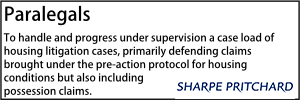

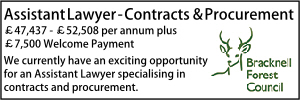








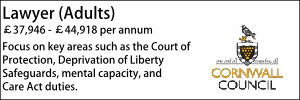

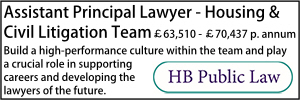
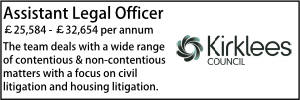
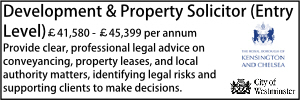

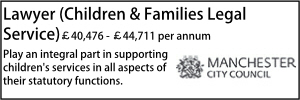


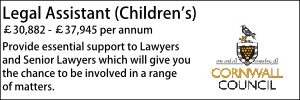





 A-Z Family Law: Take Two! - 42 Bedford Row
A-Z Family Law: Take Two! - 42 Bedford Row  Executive Programme in Public Procurement Law and Policy - University of Nottingham
Executive Programme in Public Procurement Law and Policy - University of Nottingham  Property Law Roadshow 2025 - Bristol - St John's Chambers
Property Law Roadshow 2025 - Bristol - St John's Chambers  CUBAS Comprehensive Training & Licencing (Manchester), September 2025
CUBAS Comprehensive Training & Licencing (Manchester), September 2025  AI in the Public Sector Conference - Westminster Insight
AI in the Public Sector Conference - Westminster Insight  Activism in the Workplace - 42BR Barristers Employment Law Annual Lecture
Activism in the Workplace - 42BR Barristers Employment Law Annual Lecture  DoLS Authoriser Training - LPS Law
DoLS Authoriser Training - LPS Law  Property Law Roadshow 2025 - Cardiff - St John's Chambers
Property Law Roadshow 2025 - Cardiff - St John's Chambers  Annual Fraud Conference 2025 - Oxford Investigation Service
Annual Fraud Conference 2025 - Oxford Investigation Service